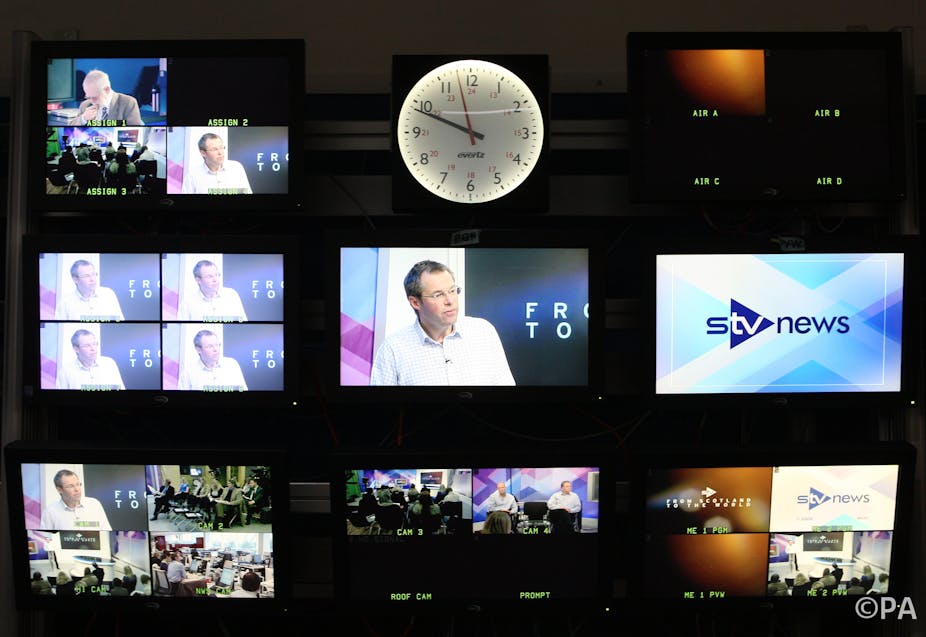At 6.30pm tonight, Scotland will lay down a milestone in one of the key debates in television: will local television become a successful and profitable part of the UK’s media scene or remain one politician’s unproven dream?
STV Glasgow, which starts broadcasting this evening to two million potential viewers, is the first of a new generation of local TV launches in Scotland. Across the UK it is the fourth such launch, but unlike Estuary TV on Humberside, which is run by a community-based group; and London Live and Norwich’s Mustard TV, which are both partly or wholly owned by local newspaper groups; STV Glasgow is the first such service to be based on an existing mainstream TV operation.

This gives it an important point of difference from previous local TV failures such as Lanarkshire TV, Edinburgh Television, Channel Six Dundee and Channel M in Manchester. It is also the only place where this version of the concept will be tested, since STV sister company ITV chose to ignore the invitation by then culture secretary Jeremy Hunt to apply to join his local TV revolution further south. For the coalition government’s only media initiative of the past four years, not to mention the shareholders of STV, this makes the stakes particularly high.
Brand recognition
While the three English local TV launches are all newish brands, STV Glasgow will seem so familiar to viewers in the west of Scotland that they may wonder exactly what’s new about it. At the same time, local TV already exists in these parts. STV’s flagship news programme, STV News at Six, already has regional editions, one of which is for Glasgow and the west of Scotland. So for half an hour each weekday, viewers in the area have already been watching TV made just for them.
There may be some brand confusion between STV’s Glasgow news and the STV Glasgow channel. There is also the potentially significant issue that unlike the English stations, STV Glasgow will not use Freeview channel 8 because the slot is taken up by Gaelic service BBC Alba. Instead it will have to find an audience from Channel 23.
On the other hand the advantages of this model over the other local TV launches are obvious: STV Glasgow will be cheaper to run because of shared production facilities, premises and airtime sales with the existing STV. On top of that is access to an archive of network-quality shows such as Taggart and the opportunity to cross-promote between channels. Other fare will include new daily magazine programme The Riverside Show and other archive shows like longstanding soap Take The High Road.
If the result of the 2010 general election had been a few seats in the other direction and Labour had hung on to power, the opportunity for STV would potentially have looked very different. The chances were that STV wouldn’t still have its own news-gathering operation, thanks to the government’s decision in 2009 to choose Scotland as one of the three areas in the UK in which to pilot the independently funded news consortia (IFNC) initiative.
The IFNCs were the suggested solution to ITV/STV’s difficulties with continuing to pay for local content. The plan was that these companies would keep showing regional news but would neither have to make nor pay for it. Instead some spare cash from the licence fee would pay the winners of a competitive process in each pilot area.
In Scotland a consortium including newspaper publishers Johnston Press, the Herald and Times Group and DC Thomson won that process. But before this became a reality the incoming government scrapped the scheme. The status quo prevailed, and indeed a new regime at ITV decided it liked regional news after all. Anyway Jeremy Hunt preferred local TV.
University assistance
One thing that has survived from the IFNC process is that some of the news consortia were put together between media owners and universities with media departments. So when STV applied for the Glasgow licence, it included a partnership with Glasgow Caledonian University. When STV Edinburgh comes on the air later this year, the partner will be Napier University.
Broadcast regulator Ofcom highlighted these partnerships in its rationale for awarding the Glasgow and Edinburgh licences to STV. Students at these universities will get experience of working in live TV that both partners hope will eventually convert into full-time jobs.
Another political twist is that if Scotland votes yes to independence in September, having its own Scottish channel would put STV in a stronger negotiating position with the SNP about post-referendum broadcasting in Scotland than simply being the junior partner in a UK channel. With so much uncertainty about the future of the BBC post-independence, this could very useful to STV.
London a bad marker
But the more immediate test is for local TV itself. It has become something of a cliché to say that if the concept is to work anywhere it will be in London because of the sheer size of the market.
I have never shared that view. London has always been a problematic “local” market. The regional TV news bulletins on BBC and ITV get much lower shares of audiences than other regions of the UK. So does the BBC local radio station. So I’m not surprised that London Live has seen low ratings so far.
My own experience running a TV station in, of all places, Kiev, is that the capital city of a country is not necessarily the best place for local TV. Other top-five cities, with none of the distractions of being a national centre of government, often have a more defined and cohesive sense of community. A bit of chippiness often helps.
So STV Glasgow seems to have a lot going for it. The right kind of city, a strong partnership with an existing player, on-air cross-promotions, a university partnership that produces potentially talented and initially lower-paid staff. The management is committed to the extent that the chief executive has even done an in-depth interview with Glasgow businessman Willie Haughey as part of the inaugural programme. But put another way, if Glasgow doesn’t work, then local TV really has got problems.

